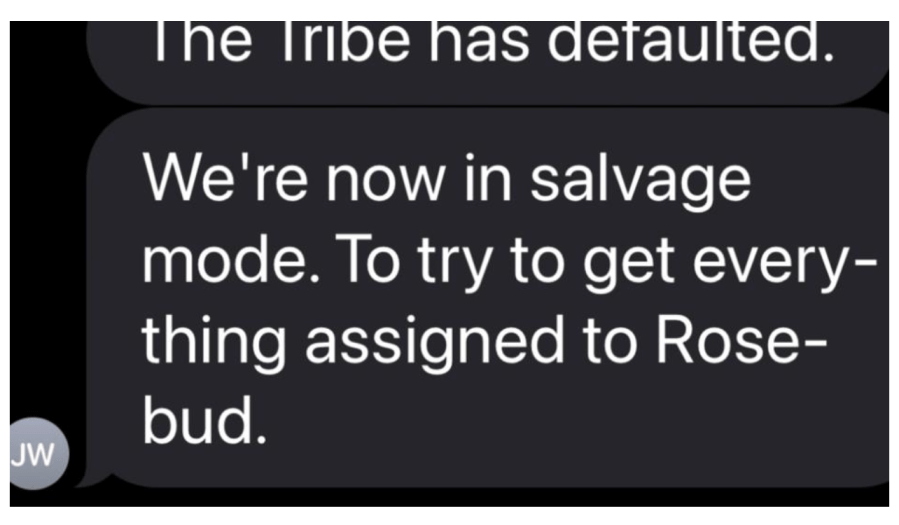Tribal company sues Greenberg Traurig, alleging financial misdeeds

A small, tribe-owned company has filed a lawsuit against legal giant Greenberg Traurig and its longtime lawyer.
The lawsuit, filed this week in the U.S. District Court in Montana, is complex and wide-ranging. But at its core, the company and five Tribal Council members allege its former legal counsel attempted to influence the company’s operations and shift its assets out of state when that influence was challenged.
The controversy hinges on the events surrounding a special meeting of the Tribal Council in January to replace the company’s board, which they allege was too cozy with Denver-based lawyer Jennifer Weddle.
The plaintiffs claim Weddle, who was legal counsel for the company for more than 13 years, would treat board members to professional sports tickets in Denver to influence their votes on business matters.
They also said they were “concerned about the influence of Defendant Weddle on the Prior Board and her involvement in setting up the financial structure and loan program,” according to the complaint.
The Island Mountain Development Group (IMDG) and five Tribal Council members say Weddle sought to prevent the council from replacing the company’s board by telling employees to protest the meeting or risk losing their jobs.
The vote to replace the IMDG board was allegedly met with threats, intimidation and the killing of two horses, according to the complaint.
When the interim board took over the company, Weddle allegedly “double crossed” her client to get lenders to issue an event of default and convert assets out of state, which was ultimately unsuccessful.
“We are reviewing the allegations in the complaint which we believe include mischaracterizations and inaccuracies. We intend to vigorously defend this lawsuit,” a spokesperson for Greenberg Traurig, the law firm Weddle works for, told The Hill in a written statement.
Weddle did not return requests for comment from The Hill.
The allegations raise questions about the internal reviews and ethics reforms Greenberg Traurig said it put in place following the biggest Washington, D.C., corruption scandal of the 2000s.
Former Greenberg Traurig lobbyist Jack Abramoff admitted to a clandestine kickback scheme that netted him tens of millions of dollars in excessive fees from the at least four tribes he represented, among other indiscretions.
Greenberg Traurig was not prosecuted in connection with Abramoff’s crimes, and in his sentencing agreement, the Justice Department said Abramoff had defrauded his former employer by asking clients to pay fees to another entity.
Fort Belknap Indian Community (FBIC) Tribal Council President Jeffrey Stiffarm, one of the plaintiffs in the IMDG suit, says pushback on his requests to then-IMDG CEO Terry Brockie for company records related to salaries, IMDG board terms and financial records — including agreements between IMDG affiliates and third-party lenders — raised “red flags.”
“For years, the Council has been asking for financial records of how much money’s coming in, where the money is going, what are the wages of that administrative staff, and they kept stonewalling us. And as owners of the company, we had the right to see this information,” Stiffarm told The Hill in a phone interview.
The former IMDG CEO did send the company’s most recent 2021 financial audit to the Council, but it raised more questions, according to a letter Stiffarm says he sent him in July 2022.
But Brockie failed to provide information on financing agreements between the IMDG, affiliated entities and third-party lenders in a response the next month, likely under the advice and direction of Weddle, the complaint alleges.
Brockie did not return The Hill’s request for comment.
The plaintiffs are hoping this information will come out in discovery, since they say their access has been limited by legal arrangements Weddle put in place to theoretically insulate the company from political influence, a source close to the lawsuit told The Hill in a phone interview.
Chaos at the Council
Forty miles south of the Canadian border, the Fort Belknap Reservation is home to members of the Assiniboine (Nakoda) and Gros Ventre (Aaniiih) Tribes.
The IMDG — which oversees a half-dozen companies operating in a variety of industries including real estate, construction, information technology, government contracting and more — is a major employer and driver of revenue for the rural community.
So after Weddle allegedly told IMDG employees that lenders would freeze all assets and they would lose their jobs if the board was replaced, the plaintiffs said more than 200 employees showed up at the Tribal Council chambers, and more than 170 employees joined on Zoom for the special meeting Jan. 19.
“Council members who voted for appointment of the Interim Board were physically and verbally assaulted by IMDG employees, who upon information and belief were being coached and encouraged by Defendant Weddle,” the complaint alleges.
In addition to Stiffarm, four members of the FBIC Tribal Council signed on as plaintiffs in the lawsuit, detailing their experience after being appointed to the IMDG interim board: Geno LeValdo, Derek Azure, Brian Wing and Curtis Horn.
Azure says he found handwritten notes on his windshield with messages including “we know where you live” and “you better watch yourself” and received texts accusing him of putting hundreds of people out of work.
IMDG employees allegedly returned the next day to demand the prior board’s reinstatement.
The complaint includes a text allegedly sent by Weddle asking, “Are people going to stake out at Council houses if this doesn’t break today?”

Azure says he came home Jan. 21 to find two of his Sorrel horses shot and a third Bay missing.
LeValdo described the unprecedented split that has persisted in his community since the meeting — which he directly attributes to Weddle’s alleged actions — in a phone interview with The Hill.
“She divided a tribe. She divided a nation. She divided a Council. She divided families,” LeValdo said.
Alleged asset transfer further divides community
The evening of the vote, Weddle allegedly called third-party lenders to trigger an event of default, a pre-negotiated condition that would allow the lenders to demand full repayment of debts or other obligations.
She then pushed to move the company’s assets to another tribe, the Rosebud Sioux Tribe of South Dakota, the complaint claims.
“The Tribe has defaulted. We’re now in salvage mode. To try to get everything assigned to Rosebud,” Weddle allegedly texted two former IMDG board members Jan. 22.

The complaint says Weddle directed IMDG’s former board members to sign documents authorizing its former CEO to set up a new account to transfer the company money, but lenders took control of IMDG’s accounts before they could do so, halting any asset conversion.
The interim IMDG board terminated its legal relationship with Greenberg Traurig and Weddle in mid-February.
But because third-party lenders declared the event of default, the company claims its reputation has taken a hit. IMDG’s chief financial officer estimates losses in the hundreds of millions of dollars over the next three to five years.
The plaintiffs believe Weddle “is still interfering with and causing harm to IMDG and the Council,” and Horn said Weddle and a lender’s representative appeared in a Zoom meeting of the interim IMDG board.
The representative, who was not named in the lawsuit, allegedly told the interim board he would come to the reservation to collect collateral including buildings, equipment and vehicles.
But for the plaintiffs, the damage goes beyond the impact on the company.
“I hate her for what she did to our people. I don’t use that word much, but I hate her for what she did to my people, our tribe, our elders and our youth,” LeValdo said. “This is going to take years for our tribe to come together and trust each other.”
Copyright 2023 Nexstar Media Inc. All rights reserved. This material may not be published, broadcast, rewritten, or redistributed. Regular the hill posts







